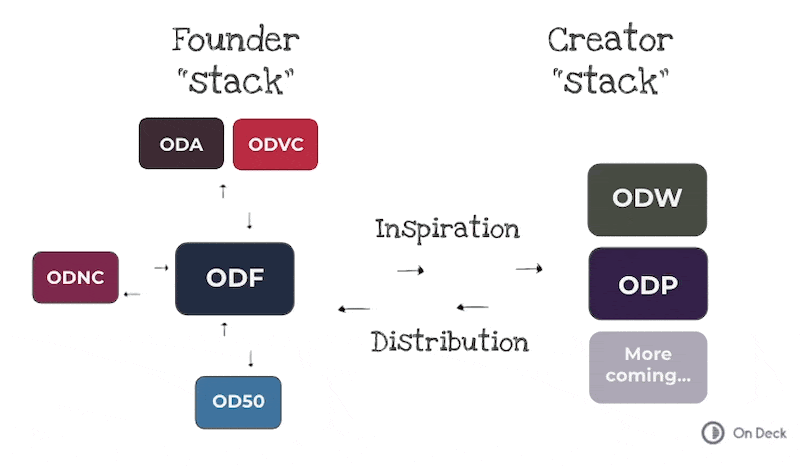Welcome to the 404 newly Not Boring people who have joined us since Monday! If you aren’t subscribed, join 41,075 smart, curious folks by subscribing here:
🎧 To get this memo straight in your ears: listen on Spotifyor Apple Podcasts
Today’s Not Boring is brought to you by… Important, Not Important
The world is changing, and the issues we face are not only connected, but enormously complex. Climate, infectious disease, pollution. To stay smart and do our part, we need to seek out the most reputable news sources and identify the most effective ways to take action.
That’s where Important, Not Important comes in.
Important, Not Important is a free weekly newsletter that curates the most vital science news of the week, providing a generalist analysis you can use to better understand what’s happening, and data-driven Action Steps to tell you what the hell to do about it, all in 10 minutes or less.
In short, Important, Not Important exists to make you feel less fucking terrified and more in control. Selfishly, I read it because today’s biggest challenges are also some of the best investment opportunities. Want to go deeper? They have a podcast, too, featuring conversations with some of the smartest humans on the planet.
Hi friends 👋 ,
Today, On Deck is announcing that it’s raising a $20 million Series A led by Keith Rabois at Founders Fund with participation from Learn Capital, Chamath Palihapitiya, Slack Fund, Village Global, Eric Yuan, Fred Ehrsam, Allison Picken’s The New Normal Fund, Charles Hudson at Precursor Ventures, Adam D’Angelo, Jen Rubio, Elad Gill, Julia DeWahl, Henry Ward, Afton Vechery, Jules Walter, Eric Su, Julia Lipton, Scott Belsky, Anthony Pompliano, Bloomberg Beta, Dylan Field, Aarti Ramamurthy, and many, many more members of the On Deck community.
I’m thrilled that Not Boring is able to invest alongside that crew to help support the creation of a modern educational institution for the future of work.
I’m particularly excited about this one as an On Deck alum and someone who once tried (and failed) to do a fraction of what On Deck is doing.
Let’s get to it.
What’s On Deck for On Deck?
A Not Boring Investment Memo: A $20 million Series A to Rebuild Education
When Not Boring Was Not Boring Club
"Find ways of staying curious and learning new things, because it's super sad to think your last day of college is the last day you are taught something new."
— Kevin Systrom, Founder, Instagram
Before Not Boring was a newsletter, it was Not Boring Club, an idea I had for a mashup of social club and continuing education, Soho House meets college extracurriculars for busy and ambitious people. My thesis was that people wanted a combination of lifelong learning and community that was more interactive than online education and much, much less expensive than an MBA, within the flow of their daily lives. I hated that the end of college meant the end of learning with friends.
To validate the opportunity, I did what I do to think through something: write. In July 2019, I wrote Why There Isn’t a Dominant Aggregator in Online Education. The numbers backed up the need for new (continuing) education models:
Education is one of only two of the top 10 consumer spending categories (at 2% of total consumer spend) not owned by an Aggregator.
In 2015, the US government spent $649 billion on K-12 education, US colleges spent $559 billion to educate and support their students. That spend accounted for ~7% of US GDP.
In 2018, student loan debt passed $1.5 trillion, and is continuing to grow.
$107 billion is spent on online education globally (and that was before COVID).
Good enough for me. When it was time to leave Breather and really go for it, I decided to do what an increasing number of founders do: apply to On Deck. I got in, and joined ODF2 in New York. I remember getting into the Slack, joining the #intros channel, and thinking that I was so far out of my depth. On Deck put together one of the most talented groups of people I’ve ever been a part of.
Turns out, On Deck was a lot of the things I was looking to build: education, community, network, friendships, and career opportunities. I made friends and connections in On Deck that I still talk to daily.
Then the pandemic hit. After briefly trying to bring the Not Boring Club online, I threw in the towel. On Deck, which had previously been entirely in-person, went the other way and stepped on the gas. It quickly moved online, welcomed global applicants, and scaled up at breakneck speed.
Over the past year, On Deck has done something insanely hard: scaled community and education, online, profitably, while growing revenue 10x and building out a platform on top of which it can launch new products and integrate acquired ones such that each is a desirable standalone offering that connects to and strengthens at least one other part of the ecosystem. If that’s a lot in one sentence, that’s because On Deck has done a lot.
While it’s so hard to avoid On Deck on Twitter that joining and/or working for On Deck has become a meme, I agree with #2 Not Boring referrer and VC Hunter Walk:
On Deck is undercovered and underappreciated relative to the strength of its business model, the frenetic pace of its progress, and the potential size of its impact (these excellent posts by Jake Singer, Paul Millerd, and Nick DeWilde aside). That’s what we’re here for.
EdTech and community have traditionally been hard categories to invest in. How did On Deck just raise $20 million from some of the world’s best venture investors? Let’s dig:
On Deck Investment Thesis.
Natively Integrated Education.
Platform and Team Constellation.
The On Deck Opportunity.
On Deck is building more than a new kind of educational institution. It’s building a new way to build.
On Deck Investment Thesis
On Deck is dramatically reimagining continuing education by breaking it into smaller atomic units, each of which feed off of each other to create a better customer experience, strong Lifetime Value, and deep moats that will protect its high price point and margins over time.
The On Deck investment thesis is a Russian Doll: there’s what they’re building, what that looks like today, and how they’re building what they’re building.
What they’re building: On Deck is building a modern, digitally native education platform at a fraction of the time and cost of traditional higher and continuing education.
What that looks like today: On Deck is comprised of 17 different programs, which themselves are comprised of smaller cohorts, which all roll up into a broader On Deck ecosystem. Each new program feeds into the others, providing “supply” for a “demand” the team has identified in existing programs. For example, On Deck Angels supplies capital to On Deck Founders, while Founders reciprocate with access to exclusive dealflow.
How They’re Building What They’re Building: The meta, how On Deck is building what it’s building, is the most unique and fascinating part. The team is building a platform on top of which it can plug in new programs. As I was thinking about what makes On Deck special, I saw this tweet:
On Deck doesn’t make programs, it makes organizations that make programs. And it does so incredibly quickly. On Deck launches new products and programs more quickly than pure software companies do, while managing all of the complexity of dealing with real humans.
When I joined, On Deck only had its Founders Fellowship. Today, a little over a year later, it has fellowships for Founders, Angels, VCs, No-Code, Writers, Podcasters, leaders scaling companies, people looking to join startups as one of the first 50 employees, Community, Climate, FinTech, and more. In eight months, they went from one fellowship to this:
One of the challenges with both community and top-tier education is that it’s really hard to scale. There’s something called “evaporative cooling,” which is when the quality of the people and interactions in a community decreases as more people join. On Deck has one of the most credible approaches to solving this challenge of any I’ve seen.
By adding new verticals instead of making the Founders Fellowship really, really big, On Deck has built a group of small, intimate communities that roll up into one large, On Deck community. Each fellowship it adds reinforces the others.
Jake Singer wrote a fantastic piece on On Deck’s Flywheel, which is spot on but misses a key element: the speed at which it turns the flywheel. The more quickly On Deck adds new high-quality programs and integrates them with the existing programs, and the faster it acquires new companies to enhance all of the existing programs, the faster the flywheel spins, the deeper the moats go, and the harder it is for anyone to compete with On Deck.
As we’ll dig into below, On Deck’s accumulated institutional program-building expertise allows it to get creative with who it taps to lead programs. Instead of hiring for educational experience, it can hire for passion, expertise, and audience, all of which increase On Deck’s awareness and credibility.
Looking at the programs together, On Deck is building what co-founder Erik Torenberg calls, “Stanford for the Internet.” Today, On Deck is where top talent, from anywhere in the world, goes to kickstart an increasing number of paths in tech and the creator economy; over time, it should be able to plug anything that people want to learn or build together into its infrastructure.
Specifically, it has two products:
A new approach to continuous online education: delivered through synchronous 'cohorts' of 100 - 200 individuals, with an emphasis on peer-to-peer learning. In 2021, On Deck will launch up to 120 of these cohorts across ~30 categories, driving substantial upfront cash flow.
A private, professional social network. Serving as the "campus" to On Deck’s "college," the On Deck product is a “market network” facilitating matching between talent and opportunity, knowledge, and more. It’s LinkedIn and AngelList meet Quora, and it’s one way that On Deck will be able to continue to charge subscription revenue long after each Fellowship ends.
Now if you’re like the investors I spoke to when I was thinking about Not Boring Club, despite everything I wrote above, you might hear the words “community” and “education” and head for the exits.
WAIT! You might want to hear On Deck’s numbers first.
On Deck is an education business with software margins: On Deck turned a profit in 2020, and entered 2021 on a ~$20M run rate. On Deck is known for its consumer-facing programs, but it currently has five revenue streams:
Consumer-Facing Programs. The bread and butter, these cover everything from the Founders Fellowship I was a part of to On Deck Writers.
Career Programs. Like the YPO for X, these are ongoing professional organizations that people should be able to expense out of their L&D budgets, for example On Deck Scale, and the new Design and Chief of Staff programs.
Partnerships. On Deck has annual partnerships with 17 partners like Stripe, Carta, Mercury, and Substack.
Recruiting. On Deck recently acquired Lean Hire, which should benefit dramatically by being plugged into the On Deck Network.
Digital Subscription Bundle. On Deck is launching an ongoing subscription to keep program participants engaged over the course of their careers.
With these programs and products, and new ones launching seemingly weekly, On Deck is on track to 10x again in the next 2-3 years. When you zoom out, what On Deck is building looks less like an educational institution and more like a really great internet business.
What makes a great internet business? It’s pretty simple: acquire customers cheaply, sell them more things, get operating leverage, produce strong margins, and build moats to protect it all. Look at On Deck:
Low CAC. On Deck doesn’t pay much for marketing. Instead, referrals from existing fellows constitute one of its biggest channels, with over 2,500 direct referrals to ODF alone. Plus, with each new high-profile program lead or participant, On Deck’s surface area and attractiveness grows.
Revenue expansion. Most educational institutions get customers for four years, and then spend the rest of their lives asking for donations. On Deck is able to cross-sell multiple programs and products to each Fellow, including an ongoing subscription.
High upfront costs, low marginal costs. On Deck is building a platform on top of which it can launch new programs and products more cheaply and quickly.
High margins. Despite requiring real live humans, On Deck is already profitable because it maintains pricing power compared to competitors (although it’s 1% as expensive as an MBA).
Moats. As the network behind On Deck scales, an increasing share of its “utility” comes through the network participants unlock through joining — which becomes increasingly hard to compete with over time. See Exhibit A: Linkedin.
It’s taken On Deck years to build its reputation and network. Invite-only dinners turned into Founder Fellowships turned into the growing network it is today. Now that it has the lead, it’s built to compound. The flywheel that makes On Deck valuable to participants also means that On Deck digs deeper moats with every program it creates, every new cohort that enters, and every connection it makes among everything that it does.
It’s building a modern educational institution that looks nothing like the ones it aims to replace.
Natively Integrated Education
Education is a massive market. Americans spend 2% of discretionary income on education, and the government spends a lot more than that. When you add job placement and company creation to the mix, and take it global, the opportunity gets so big as to make TAM calculations seem fake. People are willing to spend money to improve themselves and their lot in life.
But somehow, education has been practically impervious to technology’s attacks. Harvard could buy the three most valuable EdTech startups in the world out of its $41 billion endowment and have enough left over to buy any of the largest American companies like Udemy or Coursera, too.
The challenge, as I wrote in 2019, is that education isn’t well-suited to aggregation.
Aggregators, according to Ben Thompson, are businesses who leverage their direct relationships with a critical mass of users to exert power over increasingly modularized suppliers, creating a flywheel as more demand means more supply means more demand and so on, at decreasing unit cost to the business.
There are three main problems for would-be education aggregators:
The Job To Be Done is complex. Aggregators like Netflix, Spotify, Uber, and Facebook work well because the job to be done is simple: I need to watch/listen to something, get somewhere, or connect with friends and family. People want all sorts of things from an education, from finding a new job to satisfying their curiosity to building a network.
Supply is not sufficiently modularized. You don’t care who’s driving your Uber; you very much care who’s teaching your course and which name is on your diploma.
Success requires real effort from the user. Picking a course or program isn’t like picking something to watch on Netflix; it requires real effort to stick with it and get the most out of it. People won’t be satisfied with whatever the aggregator surfaces, and are less likely to stick it out and put in the work without group accountability.
In the piece, I suggested that since education isn’t well suited to aggregation, the Natively Integrated approach was the right one to take. Natively Integrated Companies:
Leverage technology to integrate supply, demand, and operations from day 1
Build relationships with customers to build products that resonate
Take principal risk to achieve 1) and 2) and capture a larger share of profits
This is exactly the approach that On Deck is taking to education.
Leverage Technology. It leverages social media and a digitally native team to create demand and find supply (program leads), and has built most of its product behind the scenes to facilitate connection. Even when I was in the program, Brandon Taleisnik was a no-code wizard, stitching together a variety of products to run a 200+ person program largely by himself. With a real engineering team in place today, those products will only get better.
Build Relationships. On Deck chooses which products and programs to launch based on feedback and requests from the community. On Deck Scale, for example, came out of the question “Now I’ve founded my startup, how do I grow it?”
Take Principal Risk. On Deck builds all of its programming in-house instead of aggregating supply. When it fills a program, it keeps all of the profit.
By taking this approach, On Deck is able to build something that fills a different set of needs than a traditional online course, and that fills many of the same needs an MBA does at ~1% of the cost. Paul Millerd’s meme summarizes it nicely:
Most importantly, instead of modularizing supply (in this case, program leads), On Deck understands that people follow people, and puts its team front and center.
Platform & Team Constellation
If you’re building a new kind of educational institution, one that’s born on the internet and serves the internet, you need a new kind of digitally native team.
On Deck doesn’t hire teachers or university administrators. Instead, it’s built a team of strong tech operators and investors to lead the company:
On Deck Founder & Chairman Erik Torenberg is a seasoned community builder. He was on the founding team at Product Hunt, founded Village Global, and hosts the Venture Stories Podcast.
Co-founder & CEO David Booth is an experienced 3x former founder, deep "systems thinker" with experience in finance and law, product & operations at AngelList, Carta, and CoinList;
CTO Andreas Klinger was founding CTO at Product Hunt, VP Engineering at CoinList, and Head of Remote at AngelList.
COO (Interim) Eric Friedman was previously COO at Company, Head of Expa Labs, and Global Director Sales & Revenue at Foursquare.
Head of Experience Trish Kennelly was formerly VP Product & Experience at Remote Year.
Klinger and Friedman both joined since my cohort, and when I saw the announcements of both, I was floored. They’re world-class. They were no doubt attracted by On Deck’s mission and velocity, but also by Erik and David.
I’ve gotten to know David through the Fellowship and by keeping in touch since, and have seen him work at multiple levels. He was the one in the weeds leading our Retreat to kick off the program, and he’s one of the sharpest strategic thinkers I’ve ever met, as evidenced by the speed at which On Deck is building an incredibly complex and hard-to-replicate machine. As for Erik, Keith Rabois submitted the following quote for this piece:
I backed On Deck because Erik is an excellent community builder and talent aggregator. We’ve been talking about building monopoly on talent for many years, and On Deck is doing it.
David, Erik, and the On Deck leadership team have two main jobs:
Build Out the Platform. This is all of the technology, infrastructure, processes, norms, traditions, pricing, and program structure that underpins everything On Deck does. It’s also the acquisitions On Deck makes to enhance fellow experience and increase LTV, and the decisions on which new programs to launch and who should lead them.
Recruit a Constellation of Program Leads to Build on the Platform. Because it has a nearly plug-and-play platform for building programs, On Deck is able to bring in people from non-traditional backgrounds. These people form a constellation around the core On Deck Team, and in turn, build constellations of industry leaders around themselves to participate in or advise each cohort.
A big part of the magic is who On Deck taps to run new programs. There are two sources: internal and external.
Internally, every On Deck Fellow is a potential employee or program lead. On Deck can evaluate candidates during their time in the programs, and candidates can learn what makes On Deck tick by experiencing it themselves. They bring On Deck experience, passion, and proof: if they went through On Deck and decided to work there, it must be good.
Externally, On Deck brings in people with expertise and audiences. As they join, they market On Deck to their followers, and bring in their network to lend their expertise and credibility. It seems that someone I follow on Twitter announces they’re leaving their job to launch a new On Deck program every day, to the point that I tweeted this in January:
In either case, On Deck is able to tap into a talent pool that’s much wider than a traditional educational institution, because it’s developed a playbook, processes, and tooling to make each new program more successful than the last. That means it can hire for other things like passion, expertise, and audience that increase On Deck’s awareness and credibility. At the same time, it’s able to attract high-caliber talent to run programs because On Deck itself can lend those people its shine. Nick DeWilde calls what On Deck is building a Platform Brand.

As DeWilde explains:
To recruit talented leaders for On Deck’s fellowships, Torenberg empowers them to serve as the faces of their respective fellowships and provides ample opportunities to build their public personas.
It’s working. On Deck has been able to recruit great people to lead fellowships and various parts of the business. As a couple examples of just people that I know personally.
Shriya Nevatia was the smartest person in my program when it came to community and career development, and On Deck hired her shortly after the program. First, she ran community, and she just launched On Deck Catalyst. Shriya is product-leader fit to a T.
I’ve collaborated with Gonz Sanchez, On Deck’s Head of Growth, while he was running Seedtable, and he’s one of the sharpest people I’ve worked with.
Max Nussenbaum, a fellow On Deck Founders Fellow, is a former YC founder and the highest-energy, most helpful person in my fellowship. He now runs On Deck Writers, and has invited me in to speak a couple of times. Max is a great hirer too, because he hired…
Tom White is a Writing Partner in OnDeck, and he was my editor on Conjuring Scenius. I’ve sung Tom’s praises many times -- he’s had a bigger impact on my writing than any single person -- and he is perfect for the role.
Sar Haribhakti left an awesome job as GM of Fintech at Slice to launch and run On Deck Fintech. He’s been leveraging his Twitter following to the program’s benefit, and applications have been overwhelming. He’s also assembled an all-star cast of advisors to the program.
The list goes on, and those are just some of the great people I know. If I had to pick one thing about On Deck that gives me the most confidence, it’s the people. Like Morning Brew, On Deck has recruited best-in-class talent who each bring their own skillsets and audience, and lets their personalities shine. On Deck Fintech is as much Sar as it is On Deck, for example. That increases brand awareness and reach, drives down customer acquisition costs, and brings even more great people into the On Deck Flywheel.
This is a risk for On Deck, too. By putting the individuals who run On Deck front and center, it increases the surface area for good things and bad things. If you don’t like someone who On Deck taps to run a program, it will sour the way you think about On Deck, and if a public On Deck employee tweets something stupid, that will come back to bite On Deck. Harvard has build up a reputation over centuries that can withstand the bad behavior of any one faculty member. On Deck doesn’t have that luxury.
Ultimately, though, I think it’s a smart approach, and that On Deck is just getting started.
The On Deck Opportunity
If you take one thing away from this piece, it’s this: On Deck is building a platform on top of which it can plug in any person, program, or product related to helping people get smarter, make connections, find jobs, or create.
It moves so quickly that it should be able to launch new fellowships based on whatever topic is trending by bringing in leaders in the space and minimizing the time and effort it takes them to build out a curriculum. It even has a page, On Deck Labs, where people can express interest in the programs they’d like to see next.
One obvious next step would be On Deck Crypto - this would work both as a fellowship for people who want to go into crypto full-time, and as a corporate L&D program for people at traditional companies who want to understand how to leverage Web3 technologies to improve their businesses. I’m told they’re recruiting Program Directors for both Crypto/Web3 and Digital Art (NFTs) currently, so if you want to throw your hat in the ring this may be your chance!
Another opportunity that On Deck has up on the Labs page is On Deck YouTubers. It already has programs for Writers, Podcasters, and Online Course Creators, and as the nature of work changes, and kids want to become YouTubers, On Deck will be there to show them how.
This may be On Deck’s biggest advantage over traditional educational institutions: its willingness to experiment and try new things. The world is moving ever-faster. The ways for people to make a living are constantly expanding. The half-life of professional skills has fallen to five years. A modern educational institution needs to be able to serve an increasing number of niches well to keep up. On Deck has built the infrastructure to do just that.
With that infrastructure in place, I expect to see On Deck continue to evolve how it engages with people who want to teach. Today, On Deck program leads are employees. I suspect that in the near future, industry leaders will be able to structure non-employment contracts with On Deck that let them lead one fellowship, lend their credibility, and share in the upside through a revenue share, equity grant, or maybe even an On Deck token. I certainly think we’ll see an On Deck DAO long before a Harvard DAO.
On Deck’s success isn’t guaranteed. There are real potential threats, including but not limited to:
Evaporative Cooling. Even with the best structure in place, evaporative cooling is a very real threat. On Deck will need to figure out ways to balance size, status, and utility as it grows. Being an On Deck Fellow in five years may mean something very different than being an On Deck Fellow today.
Return to Normal. On Deck benefited from a year during which everyone was stuck at home, looking to learn new skills, find new jobs, build, and find community. It will need to continue to evolve to keep up its rapid growth as people return to normal, and will likely go back to its in-person roots to let Fellows form deeper bonds IRL.
Competition. New competitors to On Deck will emerge, many of which will try to do one thing very well instead of taking On Deck’s platform approach.
The reason that I’m so bullish on On Deck is that it’s not locked into any one product or way of doing things. It’s become an adaptive organism. As On Deck grows, it’s already shifting its key value prop from status to utility. It was able to respond quickly to the pandemic-induced shift online, and already has plans in the works for a robust IRL rollout (which, of course, will feed the flywheel). And it will respond to competition by building new things on top of the platform it’s built, combining the intimacy and magic of small groups with the benefits of a scaled ecosystem.
As the world continues to change, On Deck will change with it, and prepare its members to take advantage of those changes. Being the fastest iterator is a competitive advantage in itself.
The next new Stanford won’t look like Stanford. It will be digitally native, global, and constantly evolving. It will look a lot like On Deck.
How did you like this week’s Not Boring? Your feedback helps me make this great.
Loved | Great | Good | Meh | Bad
Thanks for reading and see you on Monday,
Packy



















